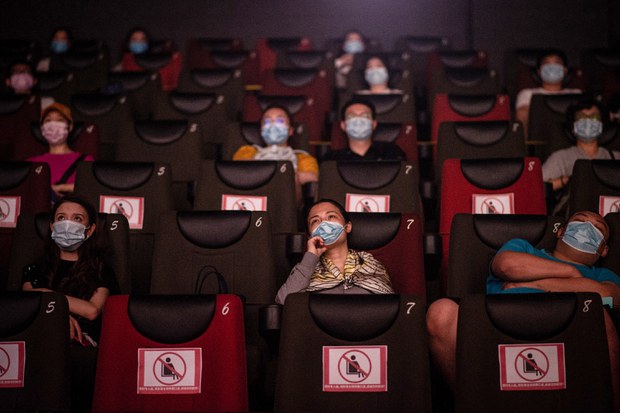China slashes number of foreign movies shown as industry lies ‘moribund’
Share

People watch a movie as they sit apart to ensure social distancing on July 20, 2020, the first day of the reopening of cinemas since the COVID-19 outbreak in China.
The Chinese Communist Party has slashed the number of foreign movies its censors approve for screening and distribution, in a sign that Chinese leader Xi Jinping is keen to isolate the country culturally from the rest of the world, commentators told RFA on Monday.
Chinese movie-goers were able to see just 38 foreign films in the first 10 months of this year, a sharp fall from 73 for the whole of 2021 and 136 in 2019.
Industry reports said the Hollywood blockbuster Avatar 2 had passed an initial review by the State Radio, Film and Television agency, but is now stuck in limbo, as it hasn’t yet received a public performance license.
The last foreign film to be released in China was the 2022 re-release of “Jaws,” on Aug. 26.
Vice minister for propaganda Sun Yeli told a news conference in August that the fall in foreign film imports was due to a number of factors, but hinted at “higher standards” being applied to U.S. films.
“Our principle, position and attitude toward exchanges between the Chinese and foreign movie industries are consistent, clear and remain unchanged,” Sun said.
U.S. films accounted for 41% of imported movies over the past decade, with 33 grossing more than one billion yuan (U.S. $138 million), and five more than two billion, he said.
“We noticed that U.S. films have been dwindling in the share of the Chinese market. I think there are various reasons for that,” he said.
“We are ready to introduce foreign films from any country as long as it can produce the good films that cater to the needs and interests of Chinese audiences,” Sun said in comments quoted by the English-language China Daily newspaper at the time.
He said movie producers needed to “respect the cultures, traditions and interests of audiences” and produce “higher-quality” films.
Foreign values and attitudes
A teacher surnamed Qian in the eastern province of Zhejiang said the Communist Party is worried that foreign movies will have too much of an impact on children.
“Foreign films show foreign values and attitudes towards life, which can have a subtle effect on people in China,” Qian told RFA. “They want people to be totally obedient to the state, and individuals to [belong to the state].”
Film distribution industry insider Huang He said it’s not just foreign films that have been affected by tighter censorship. Xi Jinping’s zero-COVID policy has also dealt a mortal blow to the domestic film industry.
“The entire industry is moribund,” Huang told RFA. “Only 60% of movie theaters in the country are open right now.”
“There are various reasons, including the pandemic, economic issues and so on,” she said.
She said China currently has an annual agreement with Hollywood to import 34 U.S.-made films, with Hollywood producers taking around 25% of mainland Chinese box office revenues.
Huang said there is currently a de facto ban on Korean movies, while no Japanese live action films are getting approval; only anime.
“Nobody dares to [distribute] movies outside of the [official] agreement, because even if they bought [the rights], the movie might not pass the review process, and could wind up never being released for various reasons,” Huang said.
“Some films aren’t getting released even after passing the [censors’] review process,” she said. “The main reason is that they don’t want people to see them, and the same is true for mainland Chinese films.”
Film approval gauntlet
Movies in China must run a gauntlet of several bureaucratic challenges before they can be shown, including a project registration number, a multilayered censorship and review process from filming to release, and a public screening license.
Foreign movies are subject to more layers of censorship and review than domestically produced films, with Hollywood producers often willing to make substantial changes to a film to get it past state censors, insiders have told RFA.
China’s domestic movie industry had already begun to contract by 2019, with ever-widening controls on the entertainment sector leaving a large chunk of its workforce unemployed.
Independent journalist Gao Yu said she wasn’t surprised by the fall in approvals of foreign films.
“It’s not surprising at all, now that China is shutting itself off [from the rest of the world],” Gao told RFA.
“Back at the time of the Sino-Soviet split [in 1960], Soviet-made movies were no longer available.”
Suzhou-based former high school teacher Pan Lu said the exclusion of foreign films is part of Xi Jinping’s insistence on cultural “self-confidence,” which goes hand-in-hand with an emphasis on traditional Chinese culture and a more aggressive foreign policy.
“It’s not just about the ongoing tightening of cultural censorship, but the ideology of restraint, which is making a comeback,” Pan told RFA.
“The biggest difference between domestically produced films and imported blockbusters lies in their values,” he said. “It’s hard to stop those values from spreading, even if you censor the film beyond recognition.”
Translated and edited by Luisetta Mudie.







